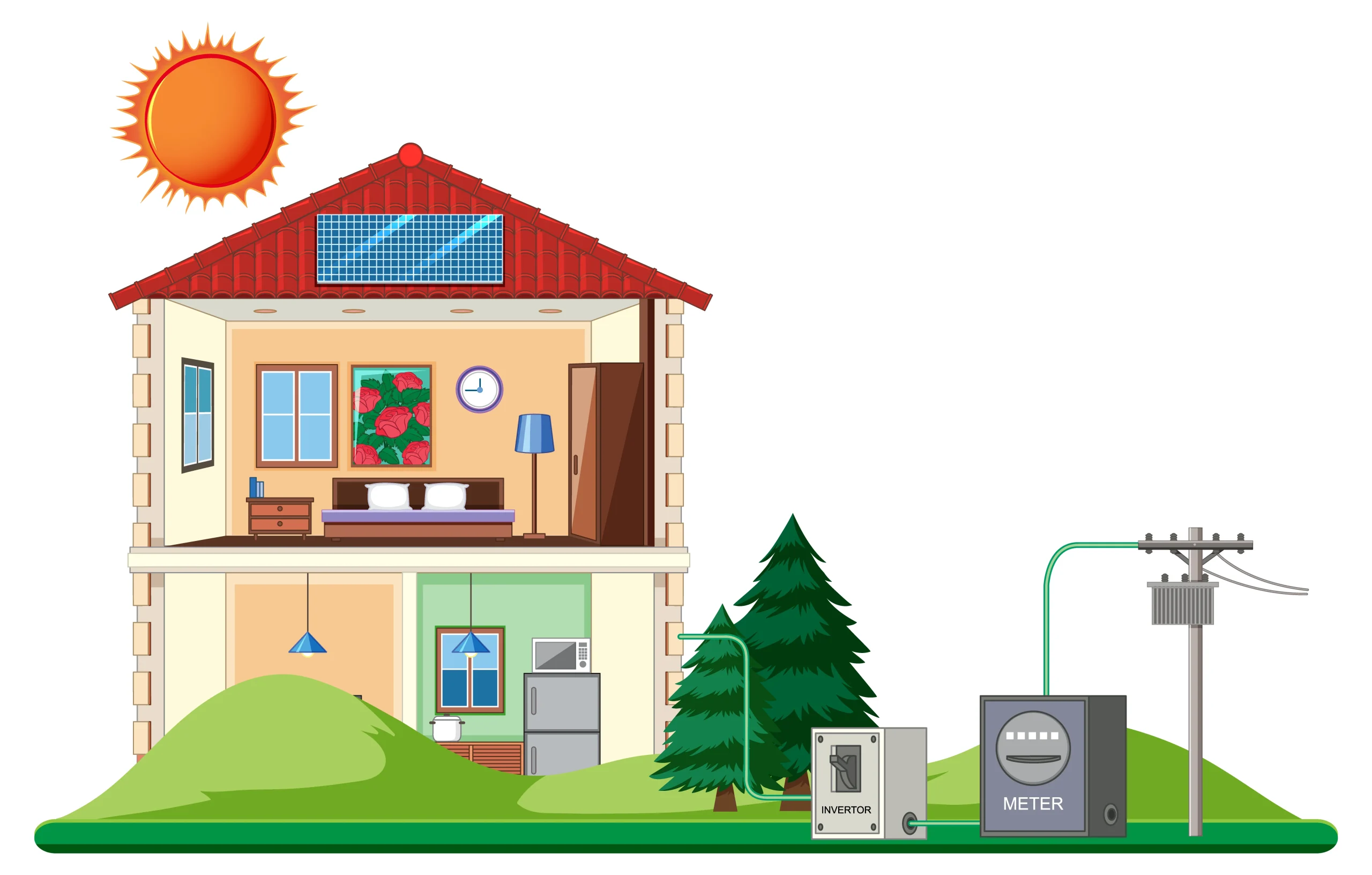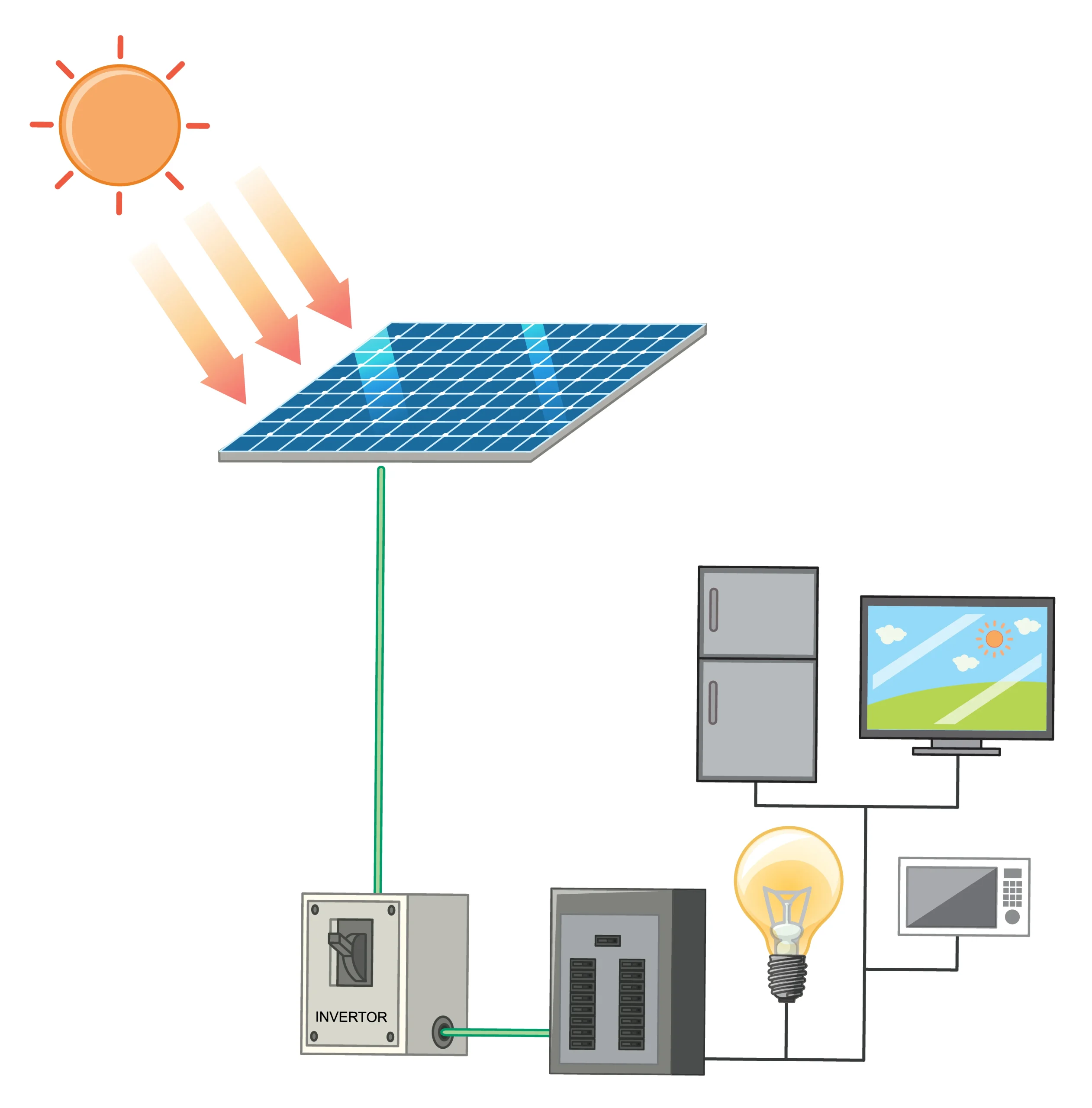Elegir el inversor adecuado es súper importante para hacer que los sistemas de energía solar funcionen bien. Esta guía analiza cómo los inversores en red y fuera de red son diferentes, qué hacen y dónde brillan. Descubra cómo las configuraciones en la red le permiten ahorrar dinero con la medición neta en las ciudades, mientras que las fuera de la red proporcionan energía constante en lugares lejanos. Vamos a comprobar cómo funcionan, lo que cuestan, y nueva tecnología fresca de WonVolt Eso hace que ambos tipos sean increíbles. Ya sea que desee ahorros conectados a la red o energía independiente, esta guía le ayuda a elegir el inversor perfecto para hogares, tiendas o grandes fábricas.
¿Qué son los inversores On-Grid y Off-Grid?
Definición y funcionalidad de los inversores en red
Inversores en redLos inversores, también llamados inversores vinculados a la red, trabajan de la mano con la red de la compañía eléctrica. Convierten la electricidad de corriente continua (CC) de los paneles solares en electricidad de corriente alterna (CA) que entra en la red. Un truco limpio es que le permiten vender energía adicional de vuelta a la red a través de la medición neta. Esto los hace súper buenos para lugares con energía constante de la red, lo que le ayuda a reducir las facturas de energía compartiendo electricidad de repuesto.
Definición y funcionalidad de los inversores fuera de la red
Inversores fuera de la red no necesitan la red de la compañía eléctrica, por lo que son excelentes para lugares lejanos sin energía de la red. Cambian la electricidad CC de los paneles solares en electricidad AC para su uso inmediato o para ahorrar en baterías. Las baterías son una gran parte de las configuraciones fuera de la red, asegurándose de tener energía cuando está oscuro o súper nublado. Estos inversores son increíbles para dar energía fiable donde la red no es estable.
Diferencias entre los inversores On-Grid y Off-Grid
Lo principal que los diferencia es cómo usan la red. Los inversores en la red necesitan una conexión sólida a la red y le permiten intercambiar energía con medición neta. Los inversores fuera de la red le dan total libertad de la red, pero necesitan baterías para almacenar energía cuando la necesite.
¿Cómo funcionan los sistemas de inversores en red?
Integración con la red de servicios públicos
Los sistemas en la red se conectan fácilmente con la red de la compañía eléctrica, compartiendo y utilizando la electricidad súper bien. El inversor se asegura de que la potencia coincida con el voltaje y la velocidad de la red.
Sincronización de potencia en tiempo real
Estos sistemas son excelentes para combinar la energía solar con lo que su casa necesita de inmediato. Ajustan su salida en función de cuánto utilices y envían más a la red.
Beneficios de la medición neta con sistemas en red
La medición neta le permite ganar créditos por la electricidad adicional que envía a la red. Esto reduce su factura de energía y hace de la energía solar una elección inteligente al recompensarlo por producir energía limpia.
¿Qué hace que los sistemas de inversores fuera de la red sean únicos?
Independencia de las redes de servicios públicos
Los sistemas fuera de la red le permiten permanecer por su cuenta, libre de las redes de las empresas eléctricas. Esta libertad significa que obtienes energía incluso durante apagones o en lugares lejanos.
Requisitos de almacenamiento de batería
Las baterías son súper importantes para configuraciones fuera de la red. Ahorran energía extra cuando sale el sol, por lo que puede usarla por la noche o en días nublados. La nueva tecnología de batería hace que funcionen mejor y duren más tiempo.
Garantizar la disponibilidad de energía en lugares remotos
Los sistemas fuera de la red están hechos para lugares sin una buena configuración de red, dando una manera verde de alimentar hogares, tiendas o incluso grandes sitios de trabajo lejos de las ciudades.
¿Cómo se comparan las métricas de rendimiento entre sistemas en red y fuera de red?
Métricas de eficiencia en diferentes escenarios
Los sistemas en la red generalmente ahorran más energía porque se conectan directamente a la red y satisfacen rápidamente las necesidades de energía. Los sistemas fuera de la red se enfocan en ser estables, especialmente en lugares lejanos donde tener energía todo el tiempo es un gran problema.
Implicaciones de costes para la instalación y el mantenimiento
Los sistemas en la red cuestan menos de instalar ya que no necesitan baterías. Pero las configuraciones fuera de la red necesitan más dinero por adelantado para las baterías, aunque te ahorran de pagar las facturas de energía más tarde.
Escalabilidad y flexibilidad en los sistemas energéticos
Ambos tipos pueden crecer para satisfacer sus necesidades. Los sistemas en la red son fáciles de hacer más grandes en las ciudades, mientras que los fuera de la red se pueden ajustar para trabajos especiales en lugares remotos.
¿Dónde se usan comúnmente los inversores en red?
A medida que las ciudades se vuelven más grandes y necesitan más energía, los sistemas solares en la red son una manera inteligente de usar la energía bien en espacios estrechos. Veamos por qué son excelentes para hogares y negocios.
Instalaciones Residenciales Urbanas
Ventajas en áreas de alta densidad
En lugares urbanos concurridos, los sistemas en red aprovechan al máximo los pequeños espacios al conectar las casas a una red. Esto comparte la energía súper bien sin necesidad de mucha tierra.
Compatibilidad con paneles solares
Los inversores en la red funcionan sin problemas con los paneles solares, lo que permite a los propietarios usar energía limpia y ahorrar dinero con ofertas de medición neta.
Aplicaciones comerciales e industriales
Los sistemas en red son súper populares para empresas y fábricas porque manejan bien las grandes necesidades de energía. Por ejemplo, un gran proyecto de techo en Tailandia utilizó paneles de 605W * 1724 PCS con inversores de 500KW * 2 PCS en la red. Estas configuraciones muestran que pueden alimentar el trabajo pesado mientras reducen la contaminación.
Para las personas que quieren soluciones de inversor de primera clase para hogares o grandes industrias, WonVolt tiene tecnología fresca construida para un gran rendimiento y una vida ecológica.
Aplicaciones y casos de uso para inversores fuera de la red
Mientras que las ciudades disfrutan de la energía de la red, los lugares rurales y lejanos necesitan soluciones inteligentes para obtener energía, haciendo de los inversores fuera de la red un cambio de juego para la energía estable, la vida verde y los planes de respaldo.
Despliegues en áreas rurales y remotas
Enfrentar los desafíos del acceso a la energía
Los inversores fuera de la red son clave para resolver problemas de energía en zonas rurales y lejanas. Estos lugares a menudo no tienen una buena configuración de red, por lo que necesitan otras formas de obtener electricidad. Los sistemas fuera de la red convierten la energía de CC del panel solar en energía de CA, proporcionando energía constante incluso sin una red. Las baterías los hacen aún más fiables, ahorrando energía durante el día para las horas nocturnas o nubladas. Para lugares con electricidad de red inestable, los sistemas fuera de la red son una opción preferida para hogares y sitios de trabajo.
Sostenibilidad en regiones aisladas
En áreas lejanas, los sistemas fuera de la red ayudan a mantener las cosas verdes. Al usar la energía solar, reducen los combustibles sucios y la contaminación. Correr sin una red no solo da energía constante, sino que también apoya los objetivos mundiales para un planeta más limpio.
Soluciones de energía de respaldo de emergencia
Los inversores fuera de la red son muy prácticos como energía de respaldo durante emergencias. Cuando las tormentas o sorpresas cortan la red, estos sistemas mantienen las luces encendidas, por lo que las cosas importantes no se detienen. Trabajan por sí mismos, lo que los convierte en una opción confiable para estar listos para los problemas.
El papel de los productos WonVolt en los sistemas energéticos
Mientras que las ciudades utilizan la energía de la red, los lugares rurales y lejanos necesitan soluciones independientes, lo que hace que los inversores fuera de la red sean vitales para la energía constante, la energía verde y el respaldo de emergencia.
Descripción general de las soluciones de inversores en red de WonVolt
Características y beneficios avanzados
Los inversores en red de WonVolt están hechos para funcionar súper bien con las redes de las empresas eléctricas. Son excelentes para combinar la producción de energía con el uso, por lo que la energía fluye sin problemas. Una gran ventaja es que soportan la medición neta, lo que le permite vender energía adicional a la red. Esto ahorra dinero y impulsa más energía limpia.
Modelos recomendados para necesidades específicas
Para hogares, los modelos de 3KW a 30KW son perfectos. Se adaptan a casas pequeñas o villas grandes. Las fábricas pueden usar modelos más grandes, como los de 500KW * 2 PCS en el proyecto de techo de Tailandia.
Descripción general de las soluciones de inversores fuera de la red de WonVolt
Integración de tecnología de vanguardia
Los inversores fuera de la red de WonVolt utilizan tecnología limpia para un rendimiento superior en lugares lejanos. Incluyen un almacenamiento de batería súper bueno que puede manejar cargas grandes durante mucho tiempo.
Productos sugeridos para diversas aplicaciones
Para empresas medianas o fábricas, el sistema RACK HV es impresionante por su alta tensión y gran capacidad (hasta 76,8 kWh por clúster). Los grandes proyectos pueden utilizar el sistema RACK HV PRO, que tiene una capacidad de hasta 243kWh por clúster, dando excelentes resultados para todo tipo de trabajo.
Factores a considerar al elegir entre inversores en red y fuera de red
Evaluación de la demanda energética
Descubrir cuánta energía necesita es clave al elegir entre sistemas en la red y fuera de ella. Las configuraciones en la red funcionan muy bien en ciudades con redes estables donde puede usar la medición neta para manejar las necesidades cambiantes. Los sistemas fuera de la red son mejores para lugares donde la energía constante es una necesidad porque la red no está allí o no es confiable.
Restricciones presupuestarias
El dinero importa mucho a la hora de tomar decisiones. Los sistemas en la red cuestan menos para comenzar ya que no necesitan baterías, pero tendrás facturas de energía. Las configuraciones fuera de la red necesitan más efectivo por adelantado para las baterías, pero lo ahorran de los costos de la red en el futuro.
Consideraciones ambientales
Ambas opciones ayudan al planeta al usar menos energía sucia, pero los sistemas fuera de la red son más frescos en lugares lejanos porque solo utilizan fuentes limpias como la solar, sin necesidad de redes antiguas.
Tendencias futuras en sistemas energéticos: la evolución de las tecnologías de inversores
Innovaciones que impulsan la próxima generación de inversores en red
El futuro de los inversores en la red consiste en hacerlos aún mejores con una coincidencia súper rápida y una medición neta mejorada. Las nuevas ideas utilizan trucos informáticos inteligentes para adivinar cuándo se necesita mantenimiento y ajustar el rendimiento en función de la cantidad de energía que usa.
Tecnologías emergentes que mejoran los sistemas fuera de la red
La tecnología de inversores fuera de la red está creciendo rápidamente con sistemas de batería inteligentes (BMS) que hacen que las baterías duren más y funcionen mejor. Las unidades de gran capacidad hechas para trabajos enormes pueden manejar las crecientes necesidades de energía, como los sistemas con una capacidad de hasta 900V.
Para cualquiera que quiera el Últimas soluciones para hogares o grandes proyectos de trabajo, WonVolt tiene productos increíbles construido para el máximo rendimiento y energía verde.
Preguntas frecuentes
P1: ¿En qué debo pensar al elegir entre sistemas en red y fuera de red?
Mira cuánta energía necesitas, cuánto dinero puedes gastar y qué es mejor para el planeta donde vives.
Q2: ¿Hay opciones de inversor híbrido?
Sí, los híbridos mezclan ambos tipos añadiendo almacenamiento de batería a un sistema en la red para respaldo adicional contra cortes de energía (con capacidades de hasta 630 kW / unidad).
Q3: ¿Cómo se mantienen confiables los sistemas fuera de la red en lugares lejanos?
Utilizan almacenamiento de batería de lujo para ahorrar energía extra durante el día para las noches o las horas de alto uso.



